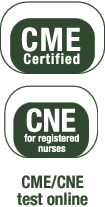METHODS
People with colorectal cancer (N = 150) who had received adjuvant chemotherapy in the past five years were recruited through advocacy groups and medical oncology practices to listen to an audio education program and complete a survey relating to the information provided in that program.
The educational program, which provided a standardized information platform, featured interviews with clinical investigators (Leonard Saltz, John Marshall, Neal Meropol, George Fisher, Robert Wolff and Axel Grothey) and seven patients (and two spouses) previously treated with adjuvant chemotherapy for colorectal cancer.
Participants were then provided with six theoretical case scenarios (Figure 3) and corresponding graphics illustrating the changes in risk of relapse associated with adjuvant chemotherapy (Figure 4).

Participants were queried about their willingness to undergo the same chemotherapy regimen they had previously received for each of the described scenarios.
The survey included a number of additional questions relating to the participants’ expectations of and experiences with adjuvant therapy, the quality of the care delivered and information provided by their oncologists and the options presented for clinical trial participation. Patients were also asked to evaluate the understandability, value and relevance of an audio/web education supplement.
A companion survey of 150 medical oncologists and 24 gastrointestinal (GI) cancer specialists was conducted, and participants were asked to consider the same six scenarios evaluated by the patients and then estimate the percent of patients in their practice they thought would be willing to undergo chemotherapy again for the benefits described.

| Table of Contents | Top of Page |

